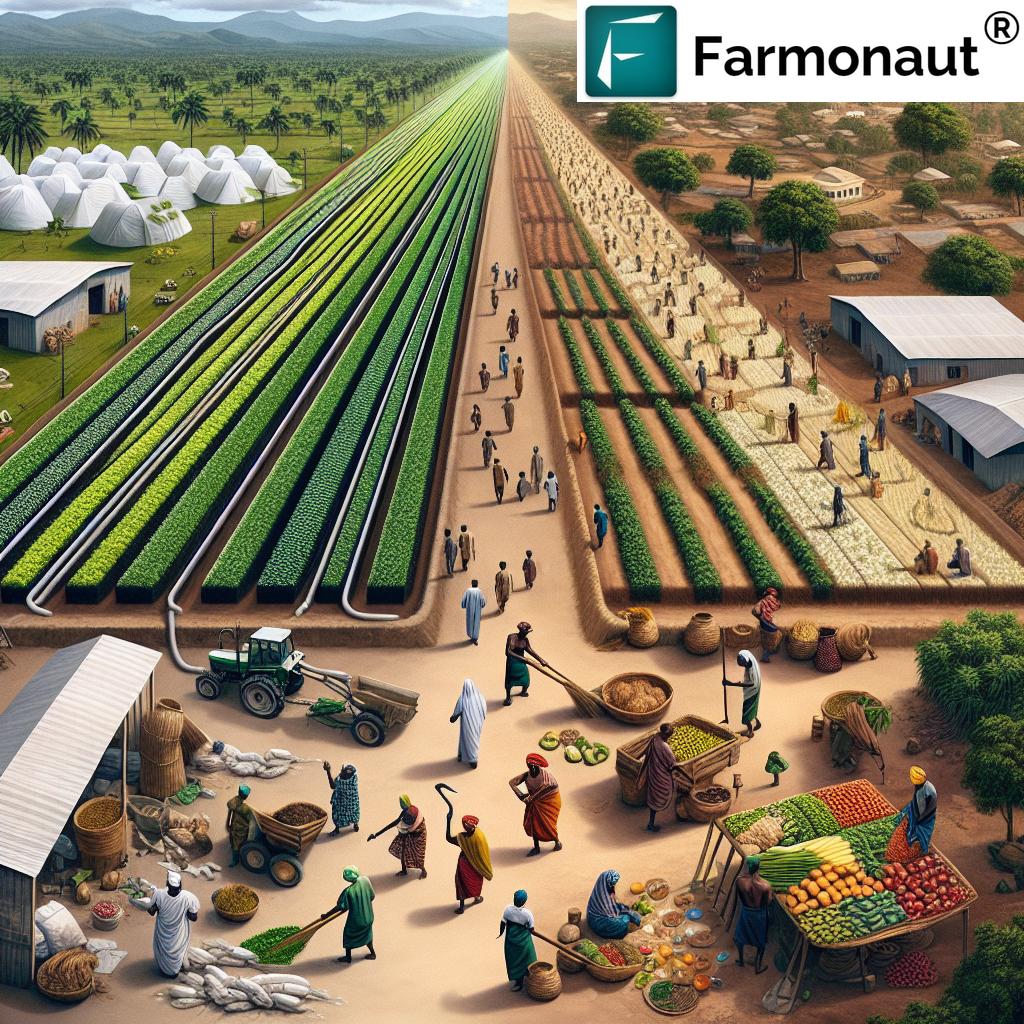Nigeria-Egypt Partnership: Boosting Agriculture and Infrastructure in FCT Abuja
“Nigeria and Egypt, Africa’s top 2 economies by GDP, are partnering to boost agriculture and infrastructure in FCT Abuja.”
In a groundbreaking development for African cooperation, we are witnessing an exciting partnership between Nigeria and Egypt, two of the continent’s economic powerhouses. This collaboration is set to revolutionize agriculture and infrastructure in the Federal Capital Territory (FCT) of Abuja, Nigeria’s capital city. As representatives of Farmonaut, a leading agricultural technology company, we are thrilled to explore the potential impact of this partnership on the region’s agricultural landscape and urban development.
The Genesis of the Nigeria-Egypt Partnership
The seeds of this promising alliance were sown during a recent visit by the Egyptian Ambassador to Nigeria, Mohamed Foaud, to the Minister of the Federal Capital Territory (FCT), Mr. Nyesom Wike. This meeting marked the beginning of what promises to be a transformative collaboration between Abuja and Cairo, focusing on three key areas: agriculture, vocational training, and urban development.
Minister Wike expressed his enthusiasm for the partnership, stating, “It would be an honor to see what the FCT could do with Cairo in terms of partnership, particularly in the areas of agriculture and vocational training. This is very key for us.” This statement underscores the significance of this collaboration for Nigeria’s capital and its potential to drive growth and development in critical sectors.

The Role of Technology in Agricultural Advancement
As we delve into the potential of this partnership, it’s crucial to highlight the role of technology in modernizing agriculture. Farmonaut, with its advanced satellite-based farm management solutions, stands at the forefront of this agricultural revolution. Our platform offers real-time crop health monitoring, AI-based advisory systems, and resource management tools that could significantly enhance the agricultural initiatives stemming from the Nigeria-Egypt collaboration.
To explore how Farmonaut can contribute to precision agriculture in Africa, consider accessing our services through our web application:
Infrastructure Development: A Pillar of Growth
The partnership between Nigeria and Egypt extends beyond agriculture, encompassing significant infrastructure projects that are set to transform Abuja’s urban landscape. Ambassador Foaud praised the ongoing infrastructural transformation in Abuja, particularly commending the work of Arab Contractors, an Egyptian company executing the construction of the Airport Road-Kuje Expressway project.
This collaboration in infrastructure development showcases the strength of Nigerian-Egyptian cooperation and sets a precedent for future projects. As both countries share their expertise in urban planning and expansion, we can expect to see innovative solutions to common challenges faced by rapidly growing African cities.
Vocational Training: Empowering the Workforce
A key focus of the partnership is vocational training, which is essential for building a skilled workforce capable of driving economic growth. By sharing knowledge and resources in this area, Nigeria and Egypt are investing in their most valuable asset: their people. This initiative aligns perfectly with Farmonaut’s mission to make precision agriculture accessible to farmers worldwide.
For those interested in learning more about precision agriculture and how it can benefit from vocational training initiatives, our Android and iOS apps offer valuable insights:
The Impact on African Continental Growth
The Nigeria-Egypt partnership is not just about bilateral relations; it has the potential to drive continental growth. As Ambassador Foaud noted, “As the biggest two countries on the continent, I think we share the responsibility of enhancing our bilateral relations to take the continent to a greater height.” This sentiment reflects the broader implications of this collaboration for Africa’s economic future.
Leveraging Technology for Agricultural Advancement
In the context of this partnership, it’s crucial to highlight how technology can play a pivotal role in advancing agricultural practices. Farmonaut’s satellite-based crop health monitoring system, for instance, could be instrumental in helping both Nigerian and Egyptian farmers optimize their crop yields and resource management.
Our AI-driven Jeevn advisory system provides real-time insights and personalized recommendations, which could be particularly valuable in the context of the Nigeria-Egypt agricultural collaboration. By integrating such advanced technologies, both countries can leapfrog traditional farming challenges and embrace precision agriculture on a large scale.
“The Nigeria-Egypt collaboration focuses on 3 key areas: agriculture, vocational training, and urban development in Abuja.”
Urban Planning and Expansion: Learning from Each Other
One of the most exciting aspects of this partnership is the potential for knowledge exchange in urban planning and expansion. As Ambassador Foaud pointed out, “Nigeria preceded Egypt in terms of relocating its capital city… I think there is a lot of experience to share between Cairo and Abuja when it comes to this.”
This exchange of ideas and experiences in urban development could lead to innovative solutions for common challenges faced by rapidly growing African cities. From sustainable infrastructure to efficient public transportation systems, the collaboration between Abuja and Cairo could set new standards for urban planning across the continent.

The Role of Egyptian Companies in Nigeria’s Development
The success of Egyptian companies working in Nigeria, particularly in the construction sector, highlights the potential for further economic cooperation. Minister Wike praised the work of Arab Contractors, noting their excellent performance on the Airport Road-Kuje Expressway project. This success story serves as a testament to the mutually beneficial nature of the Nigeria-Egypt partnership.
As more Egyptian companies contribute to Nigeria’s infrastructure development, we can expect to see an increase in job creation, technology transfer, and overall economic growth. This collaboration also opens doors for Nigerian companies to explore opportunities in Egypt, fostering a truly reciprocal relationship.
Advancing Agricultural Practices through Technology
At Farmonaut, we believe that technology plays a crucial role in modernizing agricultural practices. Our satellite-based farm management solutions could significantly enhance the agricultural initiatives stemming from the Nigeria-Egypt collaboration. By leveraging advanced technologies, both countries can address common challenges such as climate change, water scarcity, and food security more effectively.
For instance, our real-time crop health monitoring system could help farmers in both Nigeria and Egypt optimize their irrigation practices, reduce pesticide use, and improve overall crop yields. This aligns perfectly with the partnership’s goal of boosting agricultural productivity in the FCT Abuja region and beyond.
Vocational Training: Building a Skilled Workforce
The focus on vocational training in this partnership is particularly noteworthy. By sharing knowledge and resources in this area, Nigeria and Egypt are investing in their most valuable asset: their people. This initiative could lead to the development of specialized training programs in agriculture, construction, and urban planning, equipping the workforce with the skills needed to drive economic growth.
Farmonaut’s commitment to making precision agriculture accessible aligns perfectly with this goal. Our platform could be integrated into vocational training programs, providing hands-on experience with cutting-edge agricultural technologies. This would not only enhance the skills of the workforce but also promote the adoption of sustainable farming practices across both countries.
The Potential for Blockchain in Agriculture
As we consider the future of agriculture in the context of this partnership, it’s worth highlighting the potential of blockchain technology. Farmonaut’s blockchain-based product traceability solution could play a significant role in enhancing transparency and trust in agricultural supply chains between Nigeria and Egypt.
By implementing blockchain technology, both countries could ensure the authenticity and quality of agricultural products traded between them. This would not only boost consumer confidence but also open up new markets for Nigerian and Egyptian farmers, contributing to economic growth and food security in both nations.
Comparative Analysis of Nigeria-Egypt Partnership Initiatives
| Partnership Area | Nigeria’s Contribution | Egypt’s Contribution | Expected Outcomes |
|---|---|---|---|
| Agriculture |
|
|
|
| Infrastructure Development |
|
|
|
| Vocational Training |
|
|
|
| Urban Planning |
|
|
|
The Role of Technology in Enhancing Bilateral Relations
As we explore the potential of this partnership, it’s important to highlight how technology can play a crucial role in strengthening bilateral relations between Nigeria and Egypt. Farmonaut’s advanced agricultural technologies, for instance, could serve as a bridge between the two countries, facilitating knowledge exchange and collaborative research in precision agriculture.
Our API services could be particularly valuable in this context, allowing for seamless integration of agricultural data and insights across borders. Developers and researchers from both countries could leverage this technology to create innovative solutions tailored to the specific needs of Nigerian and Egyptian farmers.
For more information on how our API can be used to enhance agricultural collaboration, visit our API page and API Developer Docs.
Sustainable Development and Environmental Considerations
As Nigeria and Egypt embark on this collaborative journey, it’s crucial to consider the environmental impact of their joint initiatives. Sustainable development should be at the forefront of all projects, especially in agriculture and urban planning. Farmonaut’s carbon footprinting feature could play a significant role in this aspect, helping both countries monitor and reduce their environmental impact.
By implementing sustainable practices and leveraging technology to optimize resource use, the Nigeria-Egypt partnership has the potential to set a new standard for environmentally conscious development in Africa. This approach not only benefits the environment but also ensures the long-term success and viability of the collaborative projects.
Economic Implications of the Partnership
The economic implications of this partnership are far-reaching. By combining their strengths in agriculture, infrastructure development, and urban planning, Nigeria and Egypt are poised to create new opportunities for economic growth and job creation. This collaboration could lead to increased trade between the two countries, the emergence of new industries, and a boost in foreign direct investment.
Moreover, the success of this partnership could serve as a model for other African countries, encouraging more intra-African cooperation and economic integration. This aligns with the goals of the African Continental Free Trade Area (AfCFTA) and could contribute significantly to Africa’s overall economic development.
The Future of African Cooperation
As we look to the future, the Nigeria-Egypt partnership sets an inspiring precedent for African cooperation. By focusing on key areas such as agriculture, infrastructure, and vocational training, this collaboration addresses critical needs while leveraging the strengths of both nations. The potential for knowledge exchange, technology transfer, and joint innovation is immense.
At Farmonaut, we are excited about the possibilities this partnership brings to the agricultural sector. Our advanced technologies in satellite-based farm management, AI-driven advisory systems, and blockchain-based traceability could play a crucial role in supporting and enhancing the agricultural initiatives stemming from this collaboration.
Conclusion: A New Era of African Cooperation
The Nigeria-Egypt partnership for boosting agriculture and infrastructure in FCT Abuja marks the beginning of a new era in African cooperation. By combining their strengths, sharing knowledge, and leveraging advanced technologies, these two economic powerhouses are setting a precedent for sustainable development and economic growth across the continent.
As we witness this exciting collaboration unfold, it’s clear that the future of African development lies in partnerships that harness the power of technology, foster knowledge exchange, and prioritize sustainable practices. The Nigeria-Egypt partnership is not just about two countries working together; it’s about paving the way for a more integrated, prosperous, and sustainable Africa.
At Farmonaut, we are committed to supporting this vision by providing cutting-edge agricultural technologies that can enhance productivity, sustainability, and economic growth. Together, we can cultivate a brighter future for African agriculture and beyond.
Frequently Asked Questions (FAQ)
- What are the main areas of focus in the Nigeria-Egypt partnership?
The partnership primarily focuses on agriculture, vocational training, and urban development in Abuja, Nigeria’s capital city. - How will this partnership benefit the agricultural sector?
It will lead to knowledge exchange in farming techniques, implementation of advanced agricultural technologies, and potentially increased crop yields and food security. - What role does infrastructure development play in this collaboration?
Infrastructure development is a key component, with Egyptian companies like Arab Contractors already involved in major projects such as the Airport Road-Kuje Expressway in Abuja. - How will vocational training initiatives impact the workforce?
Vocational training programs will help build a skilled workforce in areas such as agriculture, construction, and urban planning, enhancing employability and driving economic growth. - What potential does this partnership have for other African countries?
This collaboration could serve as a model for intra-African cooperation, encouraging similar partnerships and contributing to continental economic integration.
Earn With Farmonaut: Affiliate Program
Earn 20% recurring commission with Farmonaut’s affiliate program by sharing your promo code and helping farmers save 10%. Onboard 10 Elite farmers monthly to earn a minimum of $148,000 annually—start now and grow your income!
Farmonaut Subscriptions














